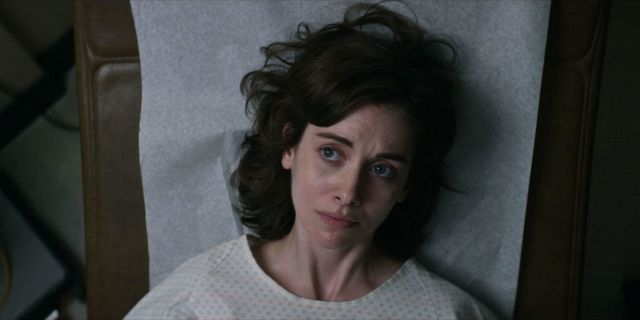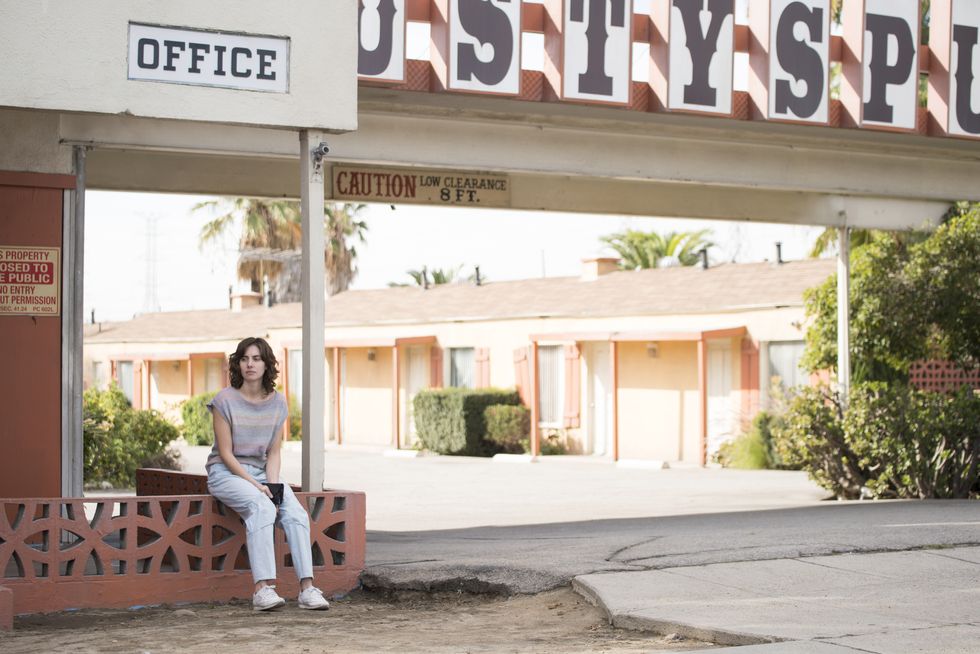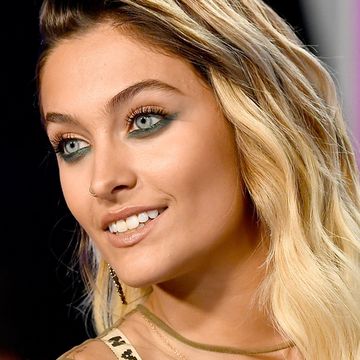If you're looking to GLOW to fill the OITNB-shaped void in your heart, you might be slightly disappointed. Though produced by Jenji Kohan and starring a diverse cast with a similarly quirky aplomb–thanks, in part, to sharing brilliant casting director Jen Euston–GLOW simply does not have the same dramatic narrative impact as OITNB, because… well, it can't. The new Netflix comedy starring wide-eyed, secret comedic weapon Alison Brie is centered around a ragtag group of aimless women trying to learn the "art" of wrestling under the hapless tutelage of a washed up, mustachioed cult-filmmaker (Marc Maron). It's not exactly ripe for the subtle horrific undertones you might find in, say, a women's federal prison.
And, of course, it's not looking to fill those shoes. GLOW's lighthearted and fun, while keeping with Kohan's constant push for diverse faces and bodies on our screens. However, eight episodes into my Saturday binge, I found myself witnessing a feminist moment like I've never seen on screen before…in just roughly nine minutes of screen-time.
*Spoilers beyond this point. Read at your own risk*
The premise of GLOW, which you won't find in any IMDB or Netflix description, is not actually '80s Women's Wrestling (shocker). It's not even really about a struggling actress who is forced to work with a group of whimsical amateurs on a project that may never leave the ground. No, GLOW centers around a frustrated, non-working actress Ruth (Brie), who's slept with her best friend's husband. When her hotter, blonder, former soap opera star BFF Debbie (Betty Gilpin) discovers the affair, she confronts Ruth mid-wrestling audition and unintentionally steals the spotlight. Plot plot plot, the two are now forced to work together as co-stars with an ensemble of kooky characters. Hijinks ensue.
But then, four fifths of the way through the series, in an episode called "Maybe It's All the Disco," Ruth discovers she's pregnant.
The B storyline begins in the locker room. The ladies are passing around tampons, while making crude jokes about sanitary pads, bonding over the fact that they're "syncing up." A few scenes later, we find Ruth in a drugstore, looking at the pregnancy tests like a teenager might awkwardly eye condoms to pocket behind their parents' backs. I audibly groan.
Though it's somewhat entertaining to watch Ruth struggle with the vintage pregnancy test that looks like the chemistry set I assume students use in high school to split atoms (that's what they do, right? I've blacked out AP chem), I was disappointed by a tropey plot device that would only serve to hurt and humiliate my favorite character further. (Hint: NOT Ruth).
After beginning to work intensively on their match choreography in the last episode and rebuild somewhat of a tenuous rapport, I expected the reveal of her pregnancy plummet them back into the divided, toxic work relationship.
But then, after just one furtive glance at a mother teaching her son to roller-skate at Sheila the She Wolf's roller rink birthday party (it was the '80s), Ruth surprised me. With a ride from director mustache, she goes to a clinic and has an abortion.
With little exposition, some off-color jokes about pulling out, and just one "Is this what you want?" in the waiting room, Ruth responds with, "Yeah. It's not the right time. Not the right baby." The brief appointment has an air of melancholy, but ultimately feels real and, quite honestly, right.
Again, she's asked, this time by a female doctor, if she's considered all her options. She has. The doctor explains that she'll feel a slight pinch when the injection at her cervix numbs her uterus. Ruth stares at the cloud-painted ceiling and the episode ends.
Abortion is apparently a very tough subject to tackle on screen. In the first season of Girls, Jessa schedules her appointment only to get her period (or maybe miscarry, it's unclear) before she can even go. Girls eventually chose to tackle the subject again during their final season, by…not going through with one. Instead Hannah weighs her options and lives her feminist truth by choosing to have her baby. This is a totally valid storyline, of course, but still does not tell the story of the 12.5 women for every 1,000 who do choose to terminate.
Scandal received praise from Planned Parenthood for their portrayal during season five, but the ultimate sadness of it left me, and some other viewers, cold. Olivia Pope sits completely alone in the waiting room and through the procedure, "Silent Night" playing softly in the background.
There's an empathy in five minutes of GLOW that I haven't seen before on screen, and hadn't even seen on the show up until that point. I'd go so far as to say her abortion is one of Ruth's only likable moments on screen.
Ruth did not sleep with her friend's husband once, but twice. She did not have sex with him out of love. In fact, it seems like she's disgusted by his presence. When it comes with dealing with higher-ups at work she's at best an insufferable suck-up, at worst, a creepy stalker who hides in the bathroom to accost a casting director. Hell, she's honestly not even a good actress (Alison Brie, on the other hand, is a delight in the role).
Her only selfless moment at that point was the decision not to bring a child into the mess Ruth's made of her life, and not to further destroy her friend who's grappling with raising her baby while trying to decide the fate of her marriage. Also, I'm not sure she could continue to be thrown around in the ring while pregnant, so there's that.
Oftentimes, even in liberal discussion, women have three possible reasons for attaining a safe abortion:
1. She was raped.
2. She, herself, is at risk during a pregnancy.
3. She is not in a financial position to support a child.
That third reason, and even the first and second, are often argued away by those (mostly old, white men) who'd say that adoption and "God's will" are obvious solutions. But these three narratives cannot possibly be the truth of every woman who's ever had to make this choice.
It's refreshing to see a show unflinchingly escape this destructive cycle. Yes, you could interpret that Ruth, who still calls her parents for help to make rent (same), was not in a position to raise a child in her run down studio apartment, but it's clear Debbie's gross husband is.
GLOW is by no means the perfect feminist show. The show did its most compelling character, Cherry, a massive disservice by repeatedly using her miscarriage as the butt of a joke, while never returning to how disgusted and ashamed she felt from her treatment by her director/friend and her cast-mates. But, a series with such a diverse cast that also gives even its most annoying character the autonomy to make an important decision about her body without dramatics and guilt? That's a show I'm invested in.














